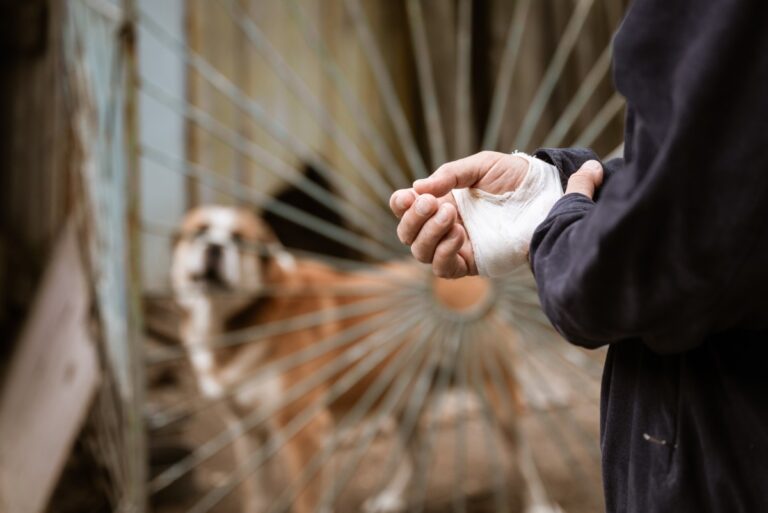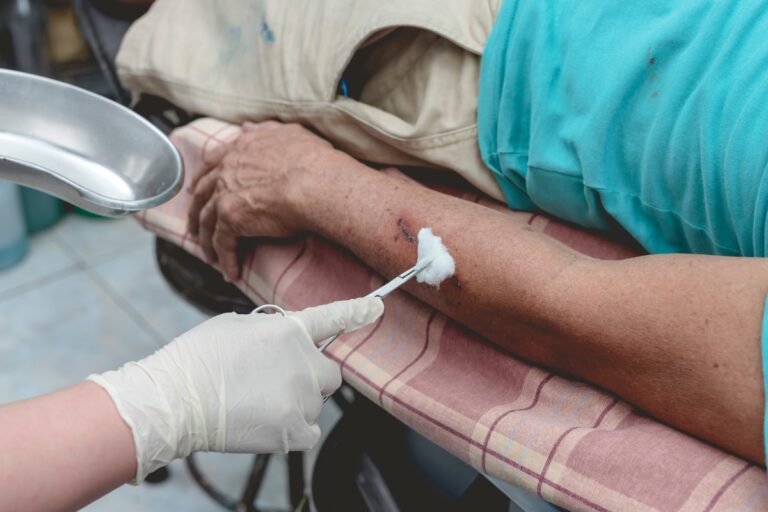Dog Bite Injuries

Colorado law protects you from injurires caused by dog attacks
When a dog bite or attack results in significant medical expenses, you may be able to get compensation for all costs related to the attack. Pain and suffering compensation is the main element of a dog bite claim and is dependent on the severity of the injury, the location of the bite, possible nerve damage, and the likelihood of long-term injury. Lost wage claims can also be included if you are unable to work.
Our experienced legal team at Legal Help in Colorado provides compassionate legal representation and advice to all victims. Our main aim is to allow them to focus on their healing and rehabilitation while making sure they get the compensation they need in order to move on with their lives in the best way possible.
What to do if you are attacked by a dog
Protect yourself first
- Try to put a barrier between you and the animal using items at your disposal. This can be a backpack, purse, or even a bicycle.
- If you are unable to put distance between you and the dog, try to remain still and avoid screaming as this can limit the damage done by the bite as well as reduce the likelihood that the dog will keep attacking you.
- After being attacked by a dog, you want to make sure you are able to get to a safe area and disengage with the animal that attacked you. This can be a car, house, or nearby store. Anywhere the dog cannot continue its assault.
Document the incident
- Record the name, contact details, and potentially any insurance information of the owner.
- Take photos of the injury before cleaning or covering the wound.
- If there are any witnesses, note their contact details.
- It may also be necessary to file a police report if the bite was particularly severe.
- Take notes of the timeline of the incident as precisely as you can.
Seek medical treatment
- You want to seek medical attention immediately. This will ensure that any injuries sustained from the bite are properly treated.
- Approximately 4.5 million dog bites occur each year in the United States. Nearly 1 out of 5 bites become infected. By seeking prompt treatment you lessen the chances of joining the 20% that get infected.
- Even if there is no visible evidence of injury, doctors can still tell if your blood pressure is elevated or if your heart rate is abnormally high. These symptoms indicate that you are experiencing stress related to being bitten by a dog.
Contact a personal injury attorney
- The next step is to contact as soon as possible a personal injury lawyer who specializes in dog bites.
- A dog bite attorney can review your case and determine whether you have grounds for a lawsuit against the dog owner.
- Once you retain legal representation, your lawyer will begin gathering evidence to support your claim, including details such as the type of dog involved, the breed of the dog, the location of the attack, the extent of the injuries sustained, and the identity of the dog owner.

Who is at fault for a dog bite?
When exploring your legal rights, the first step is to determine whether the dog owner was negligent. Negligence occurs when someone fails to act reasonably under the circumstances. In a dog bite case, this means that the person who owned the dog failed to exercise reasonable care to keep their dog from injuring others.
A negligence claim will require expert testimony to establish liability. The claimant must prove that:
- The defendant owed them a duty of care.
- They breached this duty by failing to act reasonably.
- They were harmed as a result.
- It is important to note that the standard of care doesn’t change depending on whether it’s a child or adult who has been bitten.

Negligent owners often argue that their dogs were not vicious or aggressive. However, if a dog has previously attacked people, then it is likely to be dangerous. If the owner knew about these attacks, they should have taken steps to prevent future incidents. For example, the owner could have used a muzzle on their dog, confined the dog to their personal property, or kept the dog on a leash.
This is where it gets tricky because Colorado does not have a state-wide leash law, stating instead that all dogs must be under control at all times. The state gives local governments the power to make leash laws for municipalities. As a result, most municipalities have different laws regarding leashes in various circumstances. Some require owners to keep their dogs leashed at all times when in public, while others permit owners to take off the leash under certain circumstances.
In Colorado Springs, for example, one can find dog parks where dogs are free to run off-leash and parks where a dog must always be kept on a leash. If a dog is running loose in a park that requires dogs to be leashed, potential penalties include impoundment of the animal, fines, and even jail time for the owner.
In Aspen, dogs are prohibited from running at large within the city. However, the city provides dog owners with areas for “watchful, off-leash play” in Rio Grande Park and Wagner Park.
Similar restrictions apply in Denver, Golden, and Englewood, where dogs are prohibited from running around. Sterling is even stricter: not only is it illegal for any owner to allow a dog off-leash within the city, but the owner is responsible even if the dog has run away, as it is their responsibility to ensure that they use adequate restraints.
An experienced personal injury lawyer with experience in dog bites cases will help you understand the particulars of your case.
Types of liablity in a dog bite case
In addition to negligence, there are other ways that a dog bite victim can establish liability such as: strict liability, bystander recovery, and enterprise liability.
Strict liability
Strict liability refers to situations where a defendant does something wrong without intending to harm anyone. When a dog bites someone, it is considered to be doing something wrong. Therefore, the owner of the dog may be held strictly liable for damages caused by the attack.
Bystander recovery
Another way to establish liability in a dog bite case is through a theory known as “bystander recovery.” Under bystander recovery, a plaintiff can recover damages even though they did not suffer physical injury. Instead, the plaintiff must show that they suffered emotional distress because of witnessing another person being injured.
Enterprise liability
A third option is called “enterprise liability.” Enterprise liability applies whenever a business engages in conduct that causes damage to its customers. In a dog bite lawsuit, enterprise liability would apply, for example, if a company lets employees bring their dog to work, and a customer is bitten by a dog that is not properly socialized and is unsafe around strangers. In such a case, the employer will likely be liable for the customer’s damages, as they have a duty to provide a safe environment for customers.
What are Colorado laws regarding dog bites?
Colorado uses a combination of both Strict Liability and Negligence to determine how cases are to be handled.
Colorado’s dog bite statute applies a “strict liability” rule to hold the dog’s owner liable when a dog bite causes serious injury or death. This liability applies even if the dog’s owner did not know or could not have known that the dog would bite or act aggressively.
In order for Colorado’s strict liability statute to apply, the injured person must be on public property or lawfully on private property when the injury occurs. The law only applies to injuries caused by dog bites. Most dog bites thankfully do not fall into this category of serious harm, but serious injury can occur as part of a dog attack even if it was not due to a bite. This is where the negligence approach is useful for filing an injury claim.
For cases where an injury is not a serious or deadly one, Colorado’s negligence rules apply. In a negligence dog bite case, the injured person must show that the owner failed to use reasonable care to control or restrain the dog, and a dog bite or other dog-related injury resulted.
Additionally, and while the dog owner should have not allowed the dog to bite someone at all, once the dog has bitten someone, the question becomes whether the dog owner acted reasonably after the incident occurred.
The experienced lawyers at Legal Help in Colorado will help you understand what your rights are in each case. We offer free case consultations and are always available to take your call.
Common questions about dog bite cases
The statute of limitations for filing a dog bite case varies from state to state. Some states require that you file within two years of the date of injury; others allow you to file at any time. In some cases, you may not have to prove negligence by the owner of the dog, but only that the dog was vicious or dangerous.
Colorado gives injured people two years from the date of an injury to file a lawsuit in the state’s civil court system. Missing this deadline means losing the right to get court-ordered compensation for an injury, therefore it is crucial to understand and abide by the personal injury statute of limitations as it applies to your case. Talking with Legal Help in Colorado will help you better understand how these statutes apply in your case.
For example, a dog protecting its home will cause leg, ankle, and foot injuries in 72% of the cases, whereas no injuries on these body parts will occur because a dog was in pain or roughly handled.
- Likewise, a dog playing with a human will bite the human’s hand 54% of the time but only 8% of the time will it bite a foot or leg [1]. Regardless of the location, a bite that is not treated quickly or adequately could lead to infection, tetanus, rabies, and even death.
- Tetanus is a disease that can occur when bacteria enter the body through a wound. The bacteria produce toxins that cause muscle spasms and paralysis. Untreated, tetanus can kill, which is why it is best to get a tetanus shot immediately after the attack.
- Rabies is a viral illness that affects the central nervous system. It is spread through saliva and other bodily fluids. Once contracted, there is no cure. Victims experience symptoms such as fever, headache, nausea, vomiting, and weakness. Thankfully, dogs are vaccinated against rabies: both dogs and cats over the age of six months are required to be vaccinated for rabies by a licensed Colorado veterinarian. As a result, rabies occurs mainly in wild animals such as bats, skunks, foxes, raccoons, bobcats, coyotes, etc.
The most common causes of dog bites include:
- Dogs who are not properly trained to behave around people.
- Dogs who are aggressive towards people.
- Unsupervised dogs running loose.
- Animals left unattended by owners.
- People who fail to keep their pets under control.
A common misconception is that only large dogs and those of certain breeds are a danger to people. For example, Pitt Bulls have a reputation for their violent behavior while Labrador retrievers are thought of as friendly and safe. However, in terms of how hard they can bite (measured in pounds per square inch, or psi) both Labs and Pitt Bulls bite at around 235psi. Meaning, they both can cause the same amount of damage when threatened.

Get legal help for your dog bite case
A dog bite can cause severe damage to your health and well-being and even result in death. That is why it is important to hire a qualified dog bite lawyer who has experience handling these types of cases. Ross Ziev and the legal team at Legal Help in Colorado understand how devastating a dog bite can be. We know how to help you recover damages so that you can get back on your feet again. We will handle all legal aspects of your case, thus letting you focus on what matters most—making a full recovery.
Most importantly, we only get paid when we win your case, which means you can focus on getting better while we work on your case. We will listen to you, help you understand the law, and discuss your options, all without you having to pay any out-of-pocket fees.
Knowledgeable. Compassionate. Dedicated.
We are your personal injury team.
Available 24/7 to take your call: (720) 743-3682